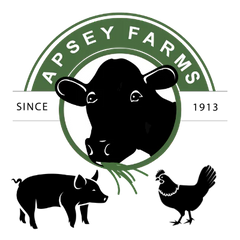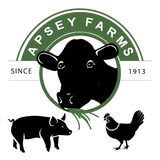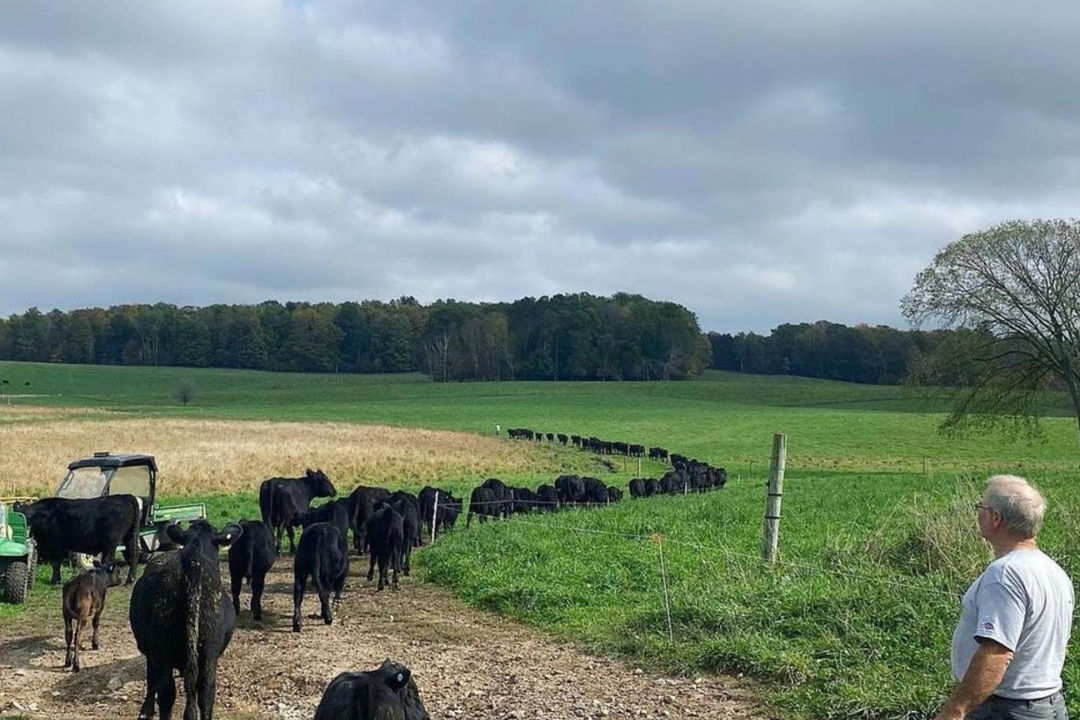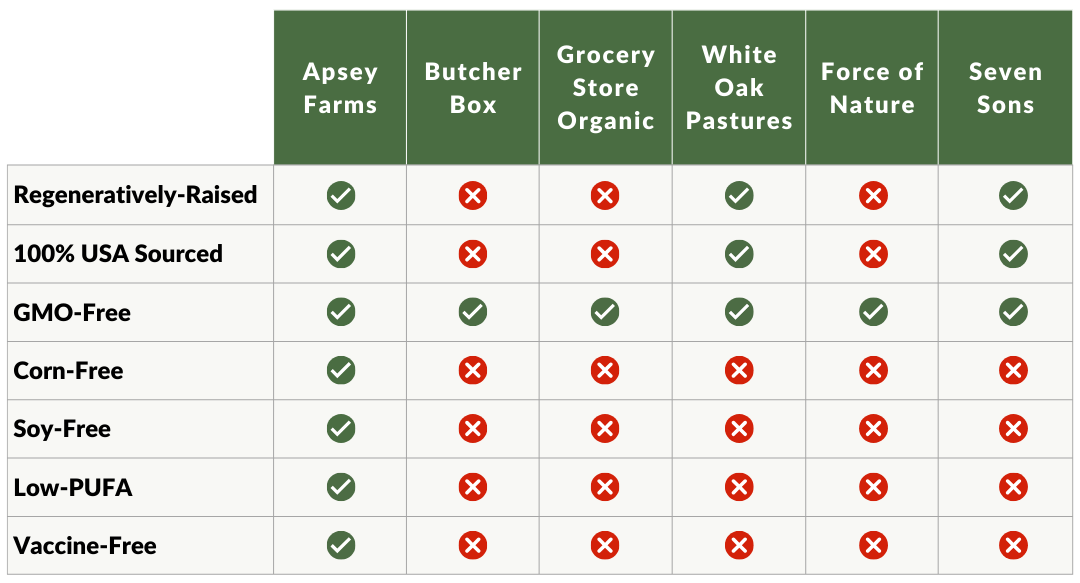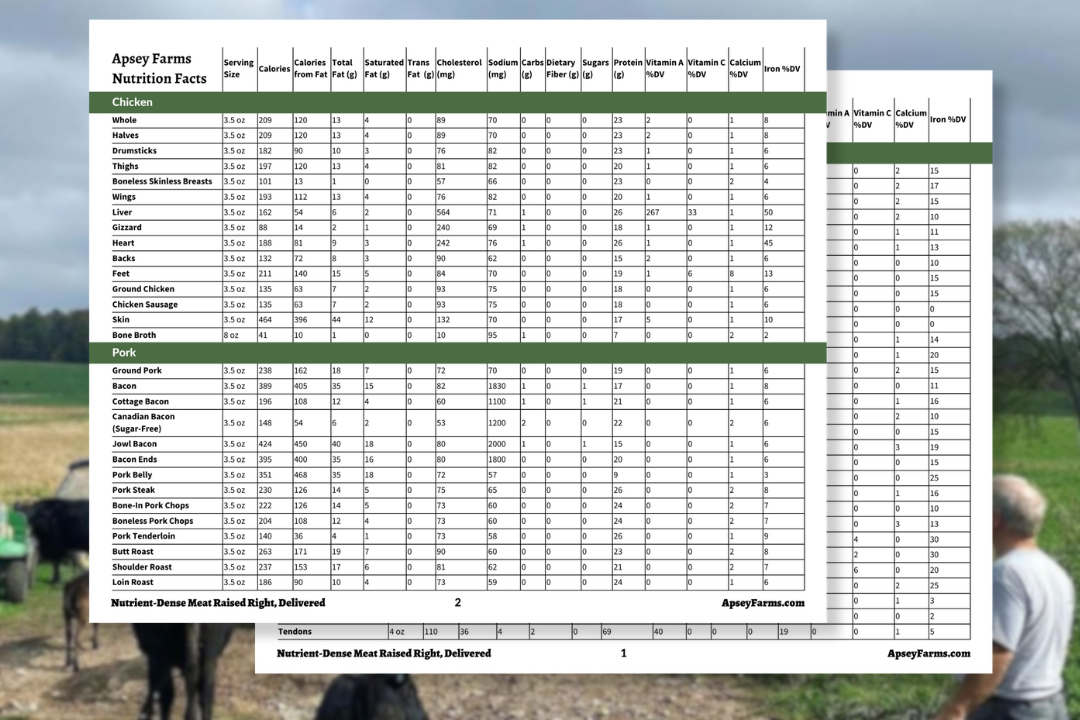Standards & Protocols
Regeneratively-Raised / Beyond Organic
We are committed to regenerative agriculture practices that not only produce high-quality products but also improve the health of our soil, animals, and the environment. Regenerative practices improve plant diversity [3], increase soil carbon levels [4] [5], and improve the ecosystem’s function. [6] [7]
We like to say we go “beyond organic” as everything we raise is on pasture and as nutrient-dense as possible. For instance, our beef is 100% grass-fed while our chickens are supplemented with a Low-PUFA corn & soy-free feed.
Our regeneratively raised animals are thoughtfully rotated across expansive pastures, allowing them to feast on nourishing grasses. This grazing regimen contributes to the animals' well-being and robustness while bolstering the soil's carbon sequestration capacity, thereby combating environmental degradation. The benefits to the animals are insurmountable.
Animal Benefits:
- Improved metabolic health [8]
- Reduced cortisol levels (less stress) [9]
- Treated humanely at all times
- Raised as nature intended, with fresh air, grass & water
Through the adoption of regenerative agriculture techniques, we can eliminate the reliance on synthetic fertilizers, pesticides, and herbicides, which have the potential to harm the environment. Instead, we place our trust in natural systems to sustain the health of our livestock and the landscapes they graze upon.
By choosing regeneratively raised meat from Apsey Farms, you are also championing sustainable farming practices that prioritize the welfare of our animals and the well-being of our planet.
Click Here to Learn the Human Benefits of Regenerative Agriculture
Ethically-Raised
We treat animals with respect and care. That's why all of our animals are ethically raised in a low-stress environment, with plenty of room to move and express their natural instincts.
We take pride in the fact that our animals are treated with the utmost care and attention. From open pastures to low-stress handling and humane harvesting, we’re committed to ethical farming practices. We only partner with family-owned abattoirs with humane, transparent operations.
Our commitment to sustainable farming practices ensures that our animals are raised in a way that supports the environment and promotes their well-being.
Low-PUFA
PUFAs (polyunsaturated fatty acids) are fats found in liquid oils such as corn, soy, safflower, sunflower, flaxseed, sesame, and peanut, which can impact the nutritional profile of the meat they produce. According to many scientists and nutritionists, including Dr. Enig, consumption of excess polyunsaturated fats are linked to inflammation, cell aging, obesity, and hormonal imbalances,including hypothyroidism and insulin resistance (diabetes). [2]
Because our animals are never fed corn and soy feed, we ensure that our products are as Low-PUFA as possible.
When you choose our products, you can be confident that you are making a health-conscious and environmentally responsible choice that supports both your well-being and sustainable farming practices.
Click Here to Learn More About PUFAs
100% Grass-Fed Beef
Our cattle are 100% grass-fed and finished. They graze the pastures and consume high-quality forage from the moment they are weaned from their mothers and are never supplemented with grains. This results in flavorful beef that contains more nutrients and healthy fats such as omega-3. [1]
Pasture-Raised Beef & Chicken
Our cattle are rotated through the pastures year-round, giving them access to graze the grass and forage. When snow makes grazing impossible in the winter, we feed them hay which we make ourselves from our fresh pasture grass.
Our chickens are also rotated through the pastures, where they consume the grass, bugs, and worms. They are also given a supplemental corn and soy-free chicken feed.
Forest-Raised Pork
Our pigs are raised in the forest with plentiful access to fresh air, sunshine, and shade. They rotate around the forest to root around to prevent brush and allow diverse grasses to grow back, providing lush silvopasture.
No Corn & Soy
Our animals never consume corn or soy as part of their diet. This commitment to producing corn and soy-free goods reflects our dedication to providing high-quality, wholesome, and alternative food options to our customers.
When you choose Apsey Farms products, you are not only selecting meat that is free from these common allergens but also supporting a farming philosophy that prioritizes nutrition, taste, and environmental responsibility.
No Vaccines
We do NOT use any vaccines for any of the livestock and products that we provide at Apsey Farms. This includes NO mRNA vaccines. It's difficult to find beef, chicken, and pork products anywhere else that are not given any vaccines.
No Antibiotics or Steroids
We proudly maintain a strict no antibiotics or steroids policy when it comes to our farming practices. We believe that this commitment is essential for the health of our animals, the quality of our products, and the well-being of our customers.
No Gluten or Dairy
We offer a variety of gluten and dairy-free products that are both delicious and healthy.
Our gluten and dairy-free products include everything from our smoked hams, breakfast sausages, bacon, and more.
Choose our gluten and dairy-free products and taste the difference that ethical and sustainable farming practices can make.
No Added Hormones
We take great pride in ensuring that our meat products are free from added hormones. We firmly believe that providing hormone-free meat is not only better for the health and well-being of our customers but also contributes to a more sustainable and ethical approach to farming.
No Processed/Refined Sugars
We offer a wide variety of sugar-free products for health-conscious consumers who want to avoid added sugars that can lead to health issues. Whether you're looking for beef, chicken, or pork, you can trust that our products are both healthy and delicious.
No GMOs
We only produce meat that is 100% free of GMO-grains. We understand that consumers today are more concerned than ever about the use of antibiotics, harmful additives, and genetically modified organisms (GMOs) in food production. Side effects to consumption of GMO meats include allergic reactions, antibacterial resistance, changes to your human DNA, and toxicity for body organs. [11]
Our commitment to non-GMO farming practices ensures the health and well-being of our animals, the quality of our meat, and the satisfaction of our customers.
No MSGs
We understand that many consumers are concerned about the health effects of consuming MSG (monosodium glutamate), a common flavor enhancer [10]. That's why we offer meat that’s MSG-free.
We are committed to providing meat that’s both ethically raised and free from harmful additives, ensuring our customers can enjoy high-quality meat without compromising their health or values.
No Nitrites/Nitrates
We offer meat that is free from synthetic nitrites and nitrates.
Our all-natural production process ensures that our meat is free from harmful additives and preservatives, including synthetic nitrates and nitrites.
Choose Apsey Farm’s nitrite/nitrate-free meat and experience the difference that ethical and sustainable farming practices can make.
